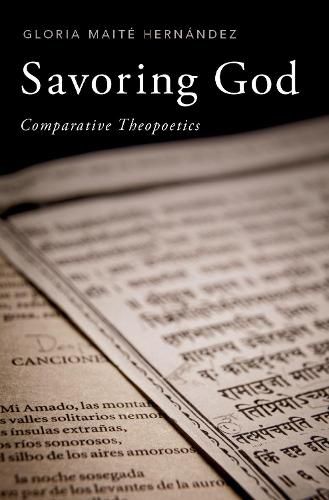Readings Newsletter
Become a Readings Member to make your shopping experience even easier.
Sign in or sign up for free!
You’re not far away from qualifying for FREE standard shipping within Australia
You’ve qualified for FREE standard shipping within Australia
The cart is loading…






Savoring God is a comparative study that examines the creative interaction of poetry and theology in two mystical poems central to the Christian and the Hindu traditions, the sixteenth-century Spanish Cantico espiritual (Spiritual Canticle), by Saint John of the Cross, and the Sanskrit R=asa L=il=a (Dance of Love), which originated in the oral tradition. Alongside the poems, Gloria Maite Hernandez examines theological commentaries on the texts: the Comentarios, written by Saint John of the Cross on his own poem, and the foundational commentary on the R=asa L=il=a by ‘Sr=idhara Sv=ami as well as commentaries by the sixteenth-century theologian J=iva Gosv=ami, from the Gau.d=iya Vai.s.nava school, and other Gau.d=iya theologians. The phrase savoring God conveys the Spanish gustar a Dios (to savor God) and the Sanskrit madhura bhakti rasa (the sweet savor of divine love). In the Christian and Hindu commentaries these two concepts describe a way of approaching the poems that is simultaneously vulnerable to the emotions evoked by the poetical imagery and responsive to its theological demands. While savoring does not mean the precisely the same thing to the Christian and the Hindu theologians, Hernandez demonstrates that both traditions interpret the term to suggest poetry’s power in mediating an encounter with the divine.
$9.00 standard shipping within Australia
FREE standard shipping within Australia for orders over $100.00
Express & International shipping calculated at checkout
Savoring God is a comparative study that examines the creative interaction of poetry and theology in two mystical poems central to the Christian and the Hindu traditions, the sixteenth-century Spanish Cantico espiritual (Spiritual Canticle), by Saint John of the Cross, and the Sanskrit R=asa L=il=a (Dance of Love), which originated in the oral tradition. Alongside the poems, Gloria Maite Hernandez examines theological commentaries on the texts: the Comentarios, written by Saint John of the Cross on his own poem, and the foundational commentary on the R=asa L=il=a by ‘Sr=idhara Sv=ami as well as commentaries by the sixteenth-century theologian J=iva Gosv=ami, from the Gau.d=iya Vai.s.nava school, and other Gau.d=iya theologians. The phrase savoring God conveys the Spanish gustar a Dios (to savor God) and the Sanskrit madhura bhakti rasa (the sweet savor of divine love). In the Christian and Hindu commentaries these two concepts describe a way of approaching the poems that is simultaneously vulnerable to the emotions evoked by the poetical imagery and responsive to its theological demands. While savoring does not mean the precisely the same thing to the Christian and the Hindu theologians, Hernandez demonstrates that both traditions interpret the term to suggest poetry’s power in mediating an encounter with the divine.